Central Asia Nervously Awaits Withdrawal of Foreign Militaries from Afghanistan
By John C. K. Daly
April 8, 2020, the CACI Analyst
After 18 months of negotiations, the U.S. and the Taliban signed their bilateral landmark “peace agreement” in Doha on February 29, alongside representatives from more than 30 nations. Afghanistan’s northern neighboring post-Soviet states, Tajikistan, Uzbekistan and Turkmenistan, are concerned whether Afghanistan’s post-ceasefire instability will intensify and subsequently spill across the borders after foreign military missions withdraw. If the unrest roiling Afghanistan erupts into open military confrontation following the departure of foreign military forces, the question is whether the three nations alone can mount an acceptable response, particularly Turkmenistan whose international neutrality stance is recognized by the United Nations.
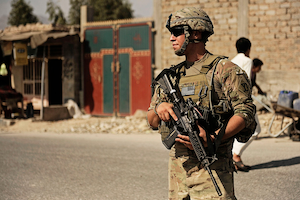
Uzbekistan's Significance in India's Central Asia Policy
By Niranjan Marjani
February 27, 2020, the CACI Analyst
Uzbekistan’s Foreign Minister Abdulaziz Kamilov visited India on January 14-15, 2020, where he met with his Indian counterpart Subrahmanyam Jaishankar and addressed the Raisina Dialogue, an international conference organized by India in which several foreign delegates share their views on global issues. This was one of several recent engagements between India and Uzbekistan. Uzbekistan has emerged as the Central Asian country with which India has not only accelerated but also diversified engagements in the past few years. This is evident from the increasing number of bilateral visits between the two countries as well as cooperation in an increasingly diverse number of areas.
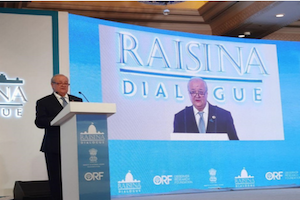
History Repeats Itself: Uzbekistan's New Eurasian Gamble
By Farkhod Tolipov
November 22, 2019, the CACI Analyst
During an official visit to Tashkent on October 2, 2019, the Speaker of the Federal Council of the Russian Federation, Valentina Matvienko, stated that Uzbekistan’s President Shavkat Mirziyoyev had decided to resolve the question of Uzbekistan’s membership in the Eurasian Economic Union (EEU). If Tashkent actually decides to join, this will be the most dramatic and fateful geopolitical turn in Uzbekistan’s post-Soviet history, since it will signify the transformation of a non-Eurasian country to an Eurasian one. This is, indeed, a moment of truth for Uzbekistan and its foreign policy since it will require public support and a clear explanation of the country’s national interests.
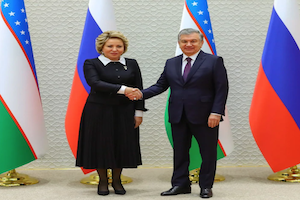
Central Asia: Delayed Consultations, Suspended Integration
By Farkhod Tolipov
July 2, 2019, the CACI Analyst
After almost a decade-long break in regional summits of Central Asian states, the ice began to melt in March 2018 when the leaders of five Central Asian states met in Kazakhstan’s capital Astana for a so-called Consultative Meeting. Many observers termed the event a revitalization of the regional cooperation process, albeit in a new temporary format for talks, and a cautious step toward a regional approach to regional problems. During that first Consultative Meeting, it was decided that the second meeting would take place in Tashkent in March 2019. However, when March came the meeting was rescheduled for April and is still delayed.
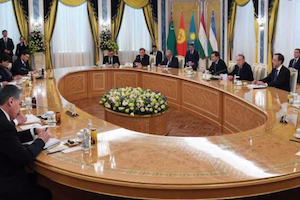
Regional Cooperation in Central Asia: Relevance of Foreign Models
Regional Cooperation in Central Asia: Relevance of Foreign Models
A renewed spirit of regionalism is emerging in Central Asia, manifested most overtly in a summit of Central Asian leaders in Astana in March 2018, and the passage of a United Nations General Assembly resolution on the Central Asian region in June of the same year. This has important implications for the region, and will inevitably lead to efforts to institutionalize regional cooperation. As Central Asians ponder how to anchor regionalism in institutions, the experiences of countries as diverse as the Nordic countries, South America, and Southeast Asia may all be relevant. After all, these and other world regions offer a rich history of efforts to develop regional cooperation. They have achieved successes, endured failures, and grappled with challenges that are not dissimilar from those faced by Central Asian leaders today.
Questions range from the technical to the political. How should the freedom of movement of people, labor issues, or trade facilitation be handled? How is regional cooperation affected by the fact that regional countries do not share the same patterns of membership in international organizations? How deeply institutionalized should regional structures be? How do they relate to outside powers, particularly large ones and potential hegemons? These questions are the focus of the following sections.

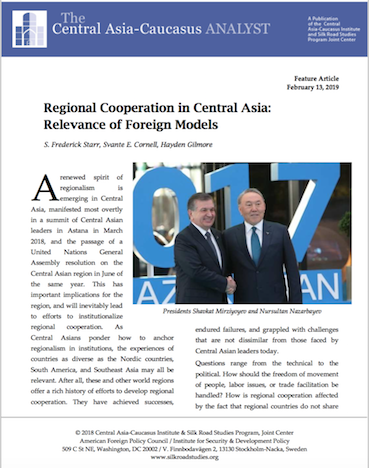





 Book S. Frederick Starr and Svante E. Cornell,
Book S. Frederick Starr and Svante E. Cornell,